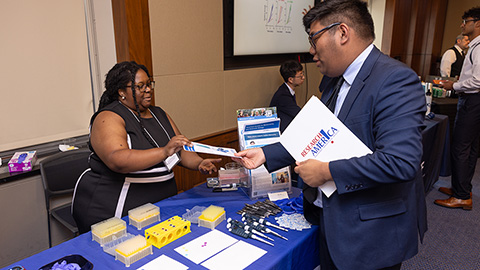When relations with China worsen, science suffers
The SECURE CAMPUS Act, legislation introduced by Republicans last week in the U.S. House and Senate, and a subsequent proclamation by President Donald Trump will damage the American research enterprise by barring certain Chinese students from studying science, technology, engineering and mathematics in America. U.S. institutions depend on international students' contributions in classrooms and laboratories, and the U.S. workforce depends on their talents and skills.
The SECURE CAMPUS Act, if it becomes law, would bar immigrants from the People's Republic of China (but not those from Hong Kong or Taiwan) from receiving visas for graduate school or postdoctoral fellowships in the United States in STEM fields. Introduced on May 27 by U.S. Sen. Tom Cotton, R-Ark., U.S. Sen. Marsha Blackburn, R-Tenn., and U.S. Rep. David Kustoff, R-Tenn., the legislation would also place restrictions on participants in Chinese foreign talent-recruitment programs, such as the Thousand Talents Program, which has been at the center of several recent court cases.
Meanwhile, the White House published on Friday a presidential proclamation suspending the entry of students and researchers affiliated with the Chinese army, saying that they may "operate as non-traditional collectors of intellectual property.” The proclamation also cancels thousands of visas for Chinese graduate students and researchers currently in the U.S. This is despite the fact that officials have acknowledged there is no evidence of wrongdoing by the students.
These actions come amid the backdrop of worsening tensions between China and the U.S.
Both countries are blaming each other for the COVID-19 pandemic. Trade relations are worsening after Secretary of State Mike Pompeo announced that the State Department no longer considers Hong Kong to have significant autonomy, which means the Trump administration is likely to end some or all of the U.S.’s special trade and economic agreements with Hong Kong. In retaliation, China ordered two major state-run agriculture businesses to suspend purchases of U.S. farm goods. This could jeopardize billions of dollars in trade when the U.S. economy is already suffering from the impact of the pandemic.
While relations between the U.S. and China have had highs and lows throughout history, collaborating on scientific research has fostered openness and togetherness since the Nixon administration. But now, political tug-of-wars are spilling into international collaboration of scientific research, which is vital for not only to spur innovation and discoveries, but also to combat the current pandemic.
Read the ASBMB's statement on the presidential proclamation and statement on the SECURE CAMPUS Act.
Enjoy reading ASBMB Today?
Become a member to receive the print edition four times a year and the digital edition monthly.
Learn moreGet the latest from ASBMB Today
Enter your email address, and we’ll send you a weekly email with recent articles, interviews and more.
Latest in Policy
Policy highlights or most popular articles

Embrace your neurodivergence and flourish in college
This guide offers practical advice on setting yourself up for success — learn how to leverage campus resources, work with professors and embrace your strengths.

ASBMB honors Lawrence Tabak with public service award
He will deliver prerecorded remarks at the 2025 ASBMB Annual Meeting in Chicago.

Summer internships in an unpredictable funding environment
With the National Institutes of Health and other institutions canceling summer programs, many students are left scrambling for alternatives. If your program has been canceled or delayed, consider applying for other opportunities or taking a course.

Black excellence in biotech: Shaping the future of an industry
This Black History Month, we highlight the impact of DEI initiatives, trailblazing scientists and industry leaders working to create a more inclusive and scientific community. Discover how you can be part of the movement.

ASBMB releases statement on sustaining U.S. scientific leadership
The society encourages the executive and legislative branches of the U.S. government to continue their support of the nation’s leadership in science.

ASBMB and advocacy: What we accomplished in 2024
PAAC members met with policymakers to advocate for basic scientific research, connected some fellow members with funding opportunities and trained others to advocate for science.

